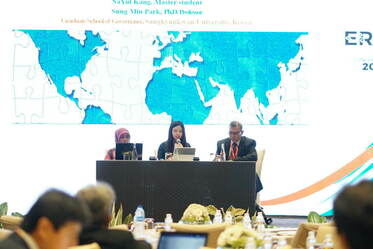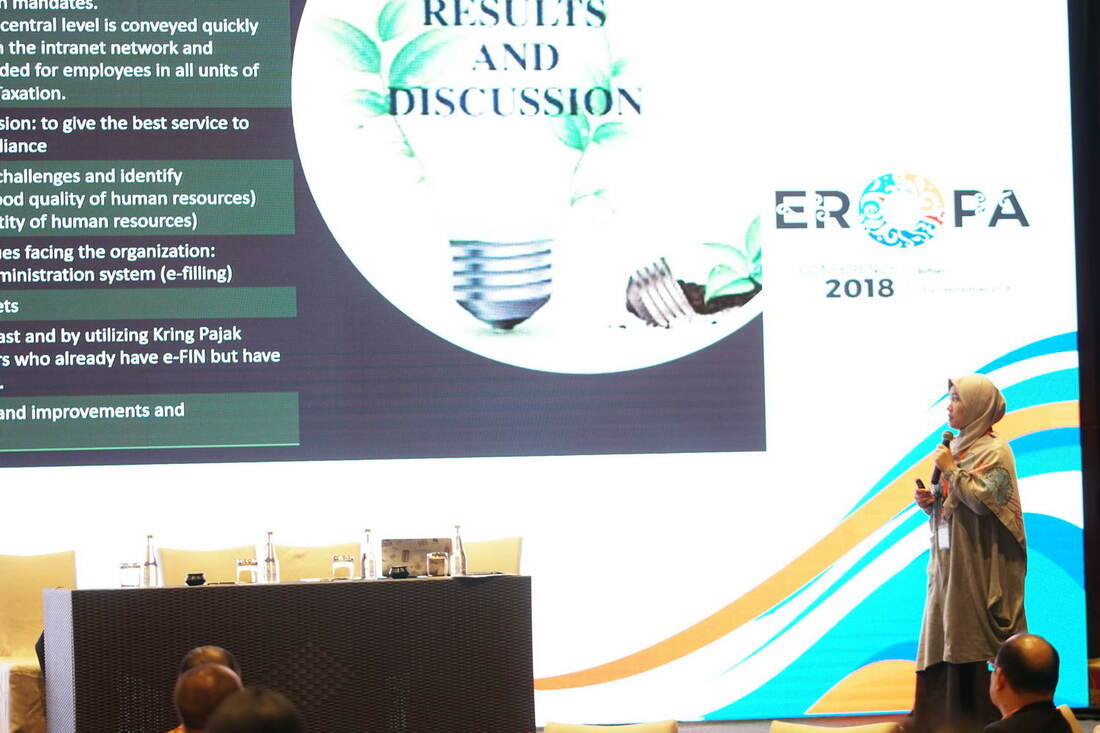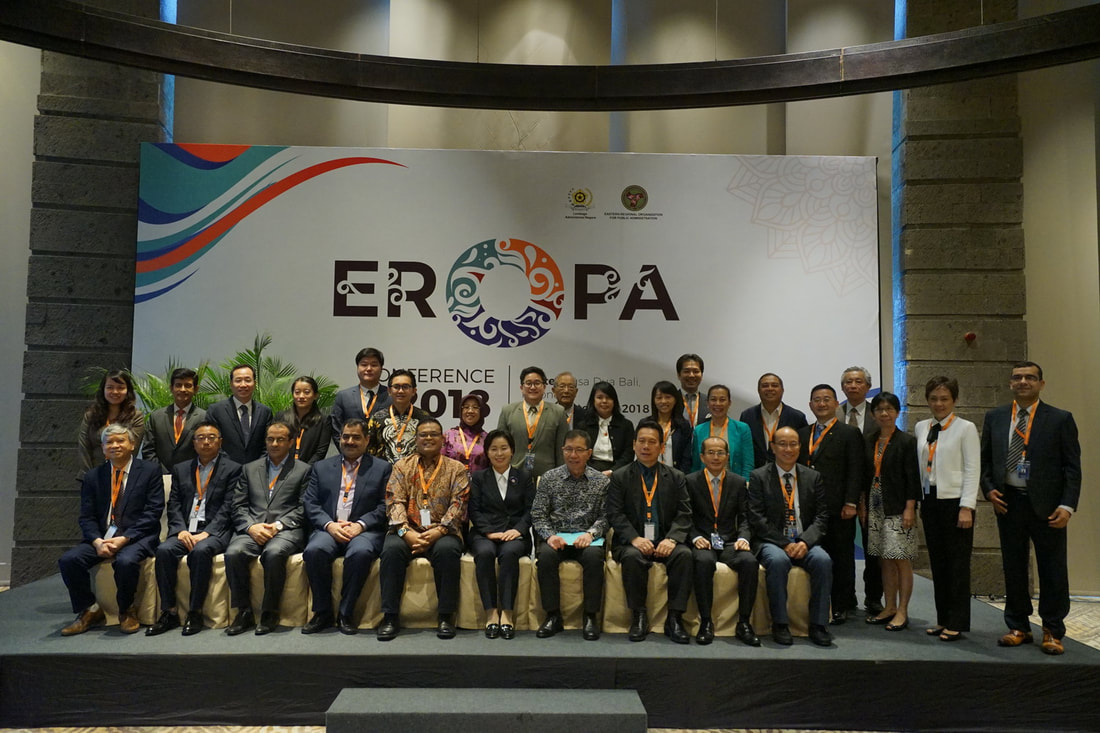|
Chaired by Mr. Muhammad Taufiq, this session dealt with people in Public Administration. The presenters for this session are: Ms. Suwatin and Ms. Nayul Kang.
In a paper entitled A Configurational Examination of Skill Mix in High Efficacy Community Health Centers in Indonesia, Ms. Suwatin aimed for her study to focus on how skill mix contributes to the organizational performance of community health centers (CHC) in Indonesia. To conclude, Dr. Suwatin shared the findings of the study. The findings showed that skill mixes ranging from five to six skills led to high efficacy CHCs. All function groups are almost always present, indicating complementarity. There was significant evidence found within group substitution, but not so much between group substitution. Afterwards, Ms. Kang presented her paper on A Comparative International Study of Organizational Culture, Public Service Motivation, and Organizational Commitment. Recognizing that there is an increasing demand for organizational change and performance in the local government scene today, Ms. Nayul Kang argued the need to study organizational culture and how it affects public service motivation (PSM), organizational commitment, and attitudes in local government units. The study compared survey data results obtained from the two countries - Korea and the Philippines - and found the following similarities: First, group culture had positive influence on development culture, while development culture had positive influence on rational culture. Second, rational culture also had a positive effect on PSM in both Korea and the Philippines. Third, public service motivation had a positive effect on organizational commitment. Meanwhile, major differences were also observed, which were as follows: First, the hierarchy culture had a negative effect on developmental culture in Korea, while significant result values were not derived between the two factors in the Philippines. Second, hierarchy culture in Korea had a positive impact on rational culture and PSM, but was not significant in the Philippines. Third, development culture had a positive effect on organizational commitment in Korea, while rational culture had a positive effect on organizational commitment in the Philippines. Lastly, in Korea, it was confirmed that the longer the length of service, the more positive it had on organizational commitment, whereas in the Philippines, it had a negative impact.
0 Comments
Chaired by Dr. Masao Kikuchi, an associate professor of public policy and management at Meiji University, Japan, this Parallel Session tackled ethics in public administration. The presenters for this session are Dr. Naoki Fujiwara, Mr. Arun Sharma and Mr. Yanuar Falak Abiyunus.
In the paper entitled Public Private Partnerships for Overseas Expansion: A Survey of Municipal Water Services in Japan, Dr. Fujiwara focused on Japanese local governments' efforts to expand their water services abroad for economic regional development. The four cases of urban municipal water services expanding abroad that were examined in the paper were Tokyo, Yokohama, Osaka and Kitakyushu - all of which developed their own public-private platforms. Dr. Fujiwara concluded that the efforts of Japanese localities' overseas expansion efforts of such municipal water services have influenced public organizations to adopt reforms in order to help create demand overseas for local water and sewerage industries and to support regional water service-related companies going abroad. On the other hand, another paper entitled Soliciting Antecedents of Tax Ethics: An Indian Perspective tackled the matter of government taxation by using statistical analysis. The study done by Mr. Sharma identified the determinants of Indian taxpayers’ morale and examined the taxpayers’ satisfaction with the government’s efforts to stimulate compliance. Lastly, Mr. Abiyunus presented Assessment of a Tax Allowance Policy: The Case of Footwear Industry in Indonesia. Indonesia's footwear industry receives incentives (i.e. tax allowance) to support its competitiveness. Despite this being the case, very limited investments in the industry are being applied and utilized for the tax allowance amid new substantial investors. Mr. Abiyunus' article assessed Indonesia's tax allowance policy in terms of five criteria of good tax policy, namely Certainty, Simplicity, Transparency and Visibility, Accountability to taxpayers, and Responsiveness. Chaired by Ms. Zita Concepcion P. Calugay of National College of Public Administration and Governance, University of the Philippines (UP-NCPAG), this session focused on public service. The presenters were Dr. Rizalino B. Cruz, Mr. Emmanuel A. Alfiler and Mr. Yogi Suwarno.
In her paper, Governiing Blue Carbon Ecosystems in the Philippines: Examining Various Tenurial Instruments in Four Municipalities of Aklan Province, Dr. Cruz's presentation focused on the factors shaping the adoption and implementation of local policies for conservation and protection of blue carbon ecosystems, that is, mangrove and seagrass ecosystems, which are found to store carbon for far longer periods of time relative to green carbon ecosystems (i.e., forests). Dr. Cruz's study looked into four cases in Aklan - namely, Kalibo, Ibajay, Cabugao and New Washington. The results of Dr. Cruz’s research showed different policy instruments that altogether apply community-based approaches and co-management principles to address different issues and contexts in each of the four cases. The findings re-echoed the need to reconcile interests and strengthen collaboration between local communities and the local government units (LGUs), as well as interlocal cooperation particularly between village-level governments (i.e., barangays). The findings also suggest the importance of collaboration in strengthening implementation and monitoring mechanisms for enforcing local policies to conserve blue carbon ecosystems. Meanwhile, Dr. Cruz cautioned against adverse effects of policy interactions and stressed the need for linking stakeholders vertically and horizontally to ensure that conservation policies and programs are coherent. Additionally, Mr. Alfiler presented his paper on Resiliency by Necessity: The "Sustainable Development Goal 13, Climate Action" Experience of the Philippines. He reviewed various national and international commitment targets, policies and programs related to climate change mitigation and adaptation, as well as reports that describe the progress the Philippine government has made so far. The findings of Mr. Alfiler’s study showed that, even before committing to then Millennium Development Goals (MDGs), the Philippine government has long been striving since the 1990s to create an enabling policy environment for climate change mitigation and adaptation, particularly through mainstreaming climate-related concerns across different sectors (energy, transport, agriculture, forestry, and waste management, among others). Recently, the Philippine government has renewed its commitment to address climate change in its 2017-2022 Philippine Development Plan and proposed measures and frameworks for disaster risk reduction and management. However, as Mr. Alfiler emphasized in his presentation, climate change mitigation and adaptation remains a continuing challenge for policymakers; program managers; and the citizens. Lastly, in a paper entitled Integrating Climate Policy Into Forestry Policy: A Study on Policy Making Within Ministry of Forestry of Indonesia, Mr. Suwarno highlighted the agencification* of policies on climate change in Indonesia and possibilities for policy integration. In his review of the national laws, policies, and organizational responsibilities of various agencies involved in mainstreaming climate change into forestry policies, Mr. Surwanto found that, under former President Yudyohono’s leadership, massive agencification was done in an attempt to clarify tasks and responsibilities of agencies involved in climate change mitigation and adaptation. However, with the change of leadership in 2012 under Widodo, policymakers promoted policy integration to facilitate coordination of climate change and forestry-related initiatives across different organizations and sectors. While both approaches to policy implementation allowed some level of disaggregation and coordination, they both failed to address policy fragmentation and political interference. That being said, Mr. Surwanto suggested that, whatever the organizational arrangement and approaches adopted by the Indonesian government, political commitment ultimately drives the success of climate change mainstreaming in forestry policy. However, in conclusion, Mr. Surwanto emphasized that both climate change and forestry are multisectoral fields, indicating the need to focus more on policy integration than agencification. *As defined in Mr. Surwanto’s study, agencification entails creating supposedly politically-insulated frontline agencies that adopt less hierarchical approaches to carry out specific functions or tasks related to climate change mainstreaming, while policy integration involves addressing climate change across various sectors and within levels of organizations, going beyond the specific tasks or functions of each agency or organization. Chaired by Dr. Alex B. Brillantes of National College of Public Administration and Governance, University of the Philippines - this Parallel Session focused on the people in public administration. The presenters for this session are Ms. Healyim Lee and Ms. Hyo Joo Lee.
Ms. Healyim Lee recognized that there exists only a few studies in Public Management that examine factors affecting followership - as well as its organizational and individual consequences. Hence, in her paper, Supportive Leadership, Followership and Performance: Evidence from Surveys of Federal Employees, she aimed to tackle this deficiency in scholarly literature. Her study posed two research questions: (1) whether followership factors relate with organizational performance; and (2), whether supportive leadership emanating from the supervisor, manager, and senior leader moderate the relationship between followership and organizational performance. Her study found that followership factors, moderated by the components of supportive leadership - are found to have a positive impact on organizational performance. On the other hand, Ms. Hyo Joo Lee presented a paper entitled Entrepreneurial Leadership and Ethical Climate in the Public Orgnanization: The Mediating Roles of Public Service Motivation and Confucian Values. Ms. Hyo Joo Lee chose to focus on the scarceness of academic inquiry on the influence of leadership innovations, culture, and motivation in the discipline of Public Management. As an ongoing research employing the theoretical lens of stewardship, path-goal and social learning theories, the study examines the direct and indirect influence of entrepreneurial leadership on ethical climate through cultural and motivational mechanisms, such as Confucian values and public sector motivation (PSM). Ms. Lee shared that through a sample of Korean employees working in the public sector within government, executive, and public enterprise agencies, partial mediation through structural equation modeling was tested. Ms. Lee concluded her presentation with the theoretical, empirical, and practical implications of the study, as well as recommendations for future research. The 2018 EROPA Conference was formally opened on 17 September 2017 at the Sofitel Nusa Dua Bali, Indonesia. The conference was jointly organized by Indonesia's National Institute for Public Administration (NIPA) and the EROPA Secretariat. Distinguished officials and guests from different state governments and other institutions graced the event.
Heads of EROPA state member delegations from the People’s Republic of China, Nepal, and Japan delivered their speeches, welcoming the participants and expressing their gratitude and appreciation to the conference organizers for their preparations for and conduct of the 2018 EROPA Conference. Delivering his speech on behalf of the Government of Japan, Mr. Shigeru Matsuzaki, President of the Local Autonomy College, reiterated EROPA’s role in improving public administration, leading towards socioeconomic development in the Asia Pacific region. In relation to this goal, Mr. Matsuzaki highlighted the importance of sharing research findings and best practices in addressing today’s public administration challenges. As such, he stressed that the need for annual EROPA conferences to continue as one of the platforms for these sharing exercises; in particular, one of the issues that EROPA members and networks need to discuss is captured, in essence, in the conference theme: “Public Administration in Managing Global Megatrends: People, Public Services, Institutions, and Ethics.” He believed that the said conference will help provide knowledge and inspire public sector innovation. Meanwhile, Mr. Matsuzaki also mentioned what Local Autonomy College, which houses the EROPA Local Government Center, is doing for EROPA. As he mentioned, the center conducts training activities each year for around 54 years, having produced a total of 625 graduates, of which 252 are from EROPA state members. It also publishes a book of readings, the Comparative Studies on Public Administration, a collection of papers on local governance and public administration from various countries. He assured the support and commitment of the Local Autonomy College to EROPA. On the other hand, Mr. Li Yu, assistant researcher at the Chinese Academy of Personnel Science, acknowledged that economic globalization and rapid technological advancements are making it increasingly challenging for the public sector to cope with complex administrative affairs and additional risk and responsibilities. Hence, governments need to innovate to remain stable and to cope with complex environmental changes. Mr. Yu mentioned that the People’s Republic of China has been actively pushing for reforms along this line, with greater focus on reform and modernization of personnel systems. These include legislating civil service system reforms and ensuring compliance or the degree of the being complimentary with existing laws, deepening reform in personnel system, and advancing state-owned enterprises in accordance with enterprise system requirements. Mr. Yu stressed that sharing of best practices is important for countries, including China, to learn from and share insights on how to improve administrative systems amid complexity. He said that the EROPA conference could be a good platform for communicating various country experiences on public sector reform in a backdrop of constant flux. He assured that the delegates from China, along with other countries, will actively participate in the conference sessions. Finally, Mr. Bhupal Baral, Joint Secretary of the Ministry of General Administration, Nepal, remarked that since it became a member of EROPA in 1983, Nepal has already been actively contributing to global initiatives of EROPA to improve public administration and governance in the region. He opined that the continued participation of Nepal in EROPA’s activities reflect its commitment to the principles and aspirations of the organization. Mr. Baral shared that Nepal is the youngest federal democratic republic, created after ten years of long-standing political transformation. That being said, restructuring of political systems and public administration in the country is still underway. As such, he hoped that the Nepali delegation would be able to learn from other states governed by federal systems. In terms of the conference theme, Mr. Baral pointed out that, indeed, dynamism and complexity present greater challenges to states, but they also present opportunities for reform across sectors, including public administration. In the case of Nepal, the imperative for administrative reform is manifest in the country’s commitment to the Sustainable Development Goals. Mr. Baral opined that, in this sense, the sharing of experiences and ideas on public sector transformation will greatly help EROPA members and networks, including Nepal, to learn from the public administration experiences of other countries. Officials and members of the Executive Council of the Eastern Regional Organization for Public Administration (EROPA) convened on the afternoon of 16 September 2018 in its 64th meeting to revisit accomplishments of the past year and to tackle the issues the organization is facing and to plan the future endeavors of EROPA. The meeting was presided over by the Chair of the National Human Resources Development Institute (NHI), Korea.
The following officials attended the meeting: Ms. Yang Hyang Ja, President, NHI, Korea (Chair); Dr. Adi Suryanto, Chair, NIPA, Indonesia (1st Vice Chair); Mr. Bhupal Baral, Secretary, Ministry of General Administration, Nepal (2nd Vice Chair); Mr. David Cabanag, representing Ms. Alicia dela Rosa-Bala, Chair, Civil Service Commission, Philippines (3rd Vice Chair); and Dr. Prijono Tjiptoherijanto, Professor, University of Indonesia and Commissioner, Civil Service Commission, Indonesia (Auditor). Meanwhile, Ms. Maria Anthonette Velasco-Allones, Executive Director, Career Executive Service Board; Ms. Risa Tanaka, Senior Deputy Director, Japan Council of Local Authorities for International Relations; and Dr. Peter K. Fong of the Hong Kong Public Administration Association, Hong Kong SAR, attended the meeting as group member representatives. Mr. Melanio Santella, Jr. and Dr. Prijono Tjiptoherijanto attended the meeting as individual member representatives. Dr. Orlando S. Mercado and Dr. Maria Fe Villamejor-Mendoza, EROPA Secretariat officials and ex-officio members of the council, also attended the meeting. |
2018 EROPA CONFERENCE BULLETINThis page contains news articles from during the conference proper of the 2018 EROPA Conference. ArchivesCategories
All
|
- Home
- About
-
Publications
- Public Administration News
-
ARPA
>
- ARPA Scope and Objectives
- ARPA Editorial Board
- ARPA Call for Papers
- Submit Article
-
ARPA Open Access
>
- India (2020-2023, Vol. 31, Nos. 1&2, pg. 4-22)
- Nepal (2020-2023, Vol. 31, Nos. 1&2, pg. 23-46)
- Vietnam (2020-2023, Vol. 31, Nos. 1&2, pg. 47-67)
- China (2020-2023, Vol. 31, Nos. 1&2, pg. 68-79)
- South Korea (2020-2023, Vol. 31, Nos. 1&2, pg. 80-99)
- Bangladesh (2020-2023, Vol. 31, Nos. 1&2, pg. 100-119)
- USA (2020-2023, Vol. 31, Nos. 1&2, pg. 120-141)
- Abstracts >
- Publication Ethics and Malpractice Statement
- Notes for Contributors
- Journal Indexing
- EROPA Bulletin >
- Resources >
- Membership
-
Conferences
-
Activities
- #TAG Dialogue
- Contact Us
- Home
- About
-
Publications
- Public Administration News
-
ARPA
>
- ARPA Scope and Objectives
- ARPA Editorial Board
- ARPA Call for Papers
- Submit Article
-
ARPA Open Access
>
- India (2020-2023, Vol. 31, Nos. 1&2, pg. 4-22)
- Nepal (2020-2023, Vol. 31, Nos. 1&2, pg. 23-46)
- Vietnam (2020-2023, Vol. 31, Nos. 1&2, pg. 47-67)
- China (2020-2023, Vol. 31, Nos. 1&2, pg. 68-79)
- South Korea (2020-2023, Vol. 31, Nos. 1&2, pg. 80-99)
- Bangladesh (2020-2023, Vol. 31, Nos. 1&2, pg. 100-119)
- USA (2020-2023, Vol. 31, Nos. 1&2, pg. 120-141)
- Abstracts >
- Publication Ethics and Malpractice Statement
- Notes for Contributors
- Journal Indexing
- EROPA Bulletin >
- Resources >
- Membership
-
Conferences
-
Activities
- #TAG Dialogue
- Contact Us




 RSS Feed
RSS Feed